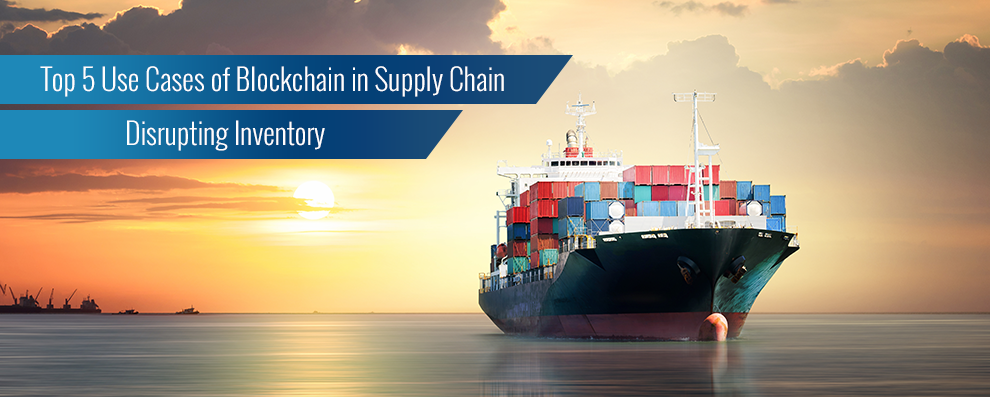
Top 5 Use Cases of Blockchain in Supply Chain Disrupting Inventory
Blockchain technology enumerates outstanding visibility, clarity and boosts efficiency across the entire supply chain industry, thereby enabling safe and smooth trading of the commodities. Before we proceed on how blockchain in supply chain is making a paradigm shift and its top 5 use cases, let’s have a quick sneak peek into what blockchain technology is and how it works. Do have a read!
What is blockchain technology and why it’s the most talked about topic in supply chain sector?
The market is time after time changing so as to keep pace with the advancing digital technologies which drive it. To keep upgrading, the enterprises are required to transpire as per the industry standards without taking risks. While many bloggers are using adjectives like disruptive, game changer, immutable etc. to describe the blockchain technology; in essence, blockchain is a technology used for decentralization and storage of transactional data.
Blockchain explained in simple words
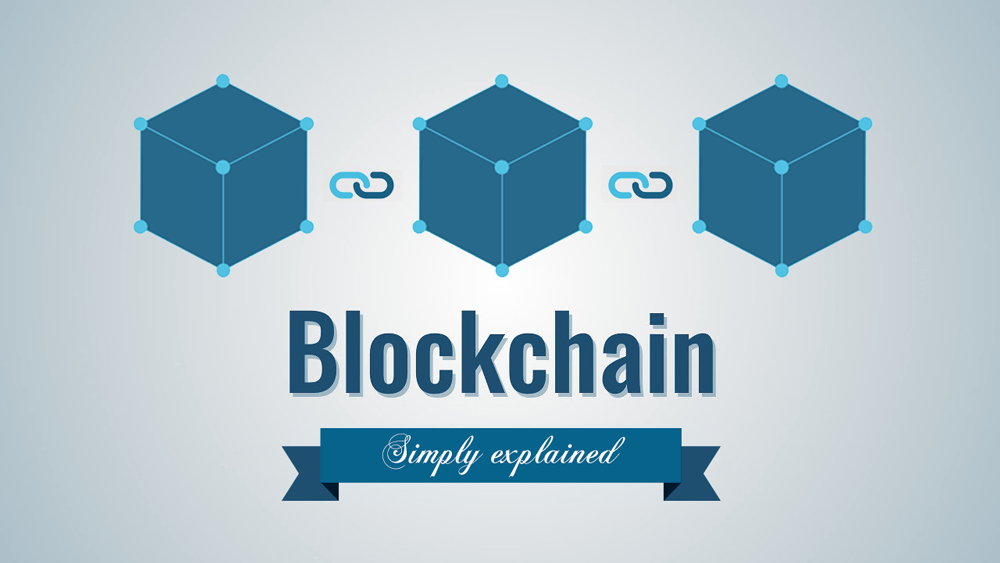
A blockchain, in the simplest terms, is a distributed ledger. Since blockchain technology was first used in finance, let’s use a relatable example –
- After you swipe your card, the merchant sends the bill to your bank
- Bank verifies and then deducts money from your account and sends it to the merchant
- Bank maintains a record of all such data in its ledger
This 3rd and final step is important — the bank maintains a record of all such transactions made by its account holders in its ledger. The bank is in complete control of your purchasing history.
However given a chance, hackers could alter the account balances and make it look like certain transactions were never done. This is where a distributed ledger/blockchain technology comes into play.
If a bank operates on a distributed ledger, every member would have a copy of the ledger. And whenever someone makes a purchase, every other member gets notified. Each member would then verify the transaction and add it to the ledger. The added record is called a “block”. These blocks get added forming a chain – a logical sequence of transactions. Blockchain ensures complete surveillance, as there’s no centralized authority that could manipulate the record. Therefore, whenever a ledger is hacked, the other ledgers can easily verify it.
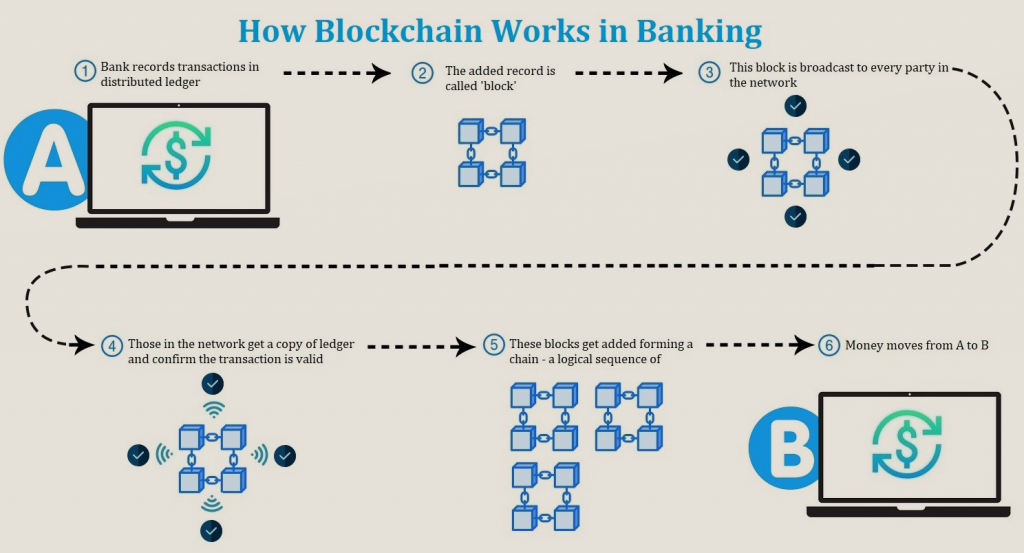
In the example above, we understood how blockchain saves time, paperwork and money of the trusted third-party authorities, mainly banks and make them less viable to fraud. Besides, blockchain technology also ensures visibility, clarity, security and above all trust, thus becoming the best hand-picked technology for future applications in supply chain management.
Be a supply chain innovator, integrate blockchain in supply chain. Research AI, IoT, Machine Learning, Big Data, Augmented Reality/Virtual Reality etc. and make your supply chain digital ready! Click To TweetTop 5 use cases of blockchain in supply chain management
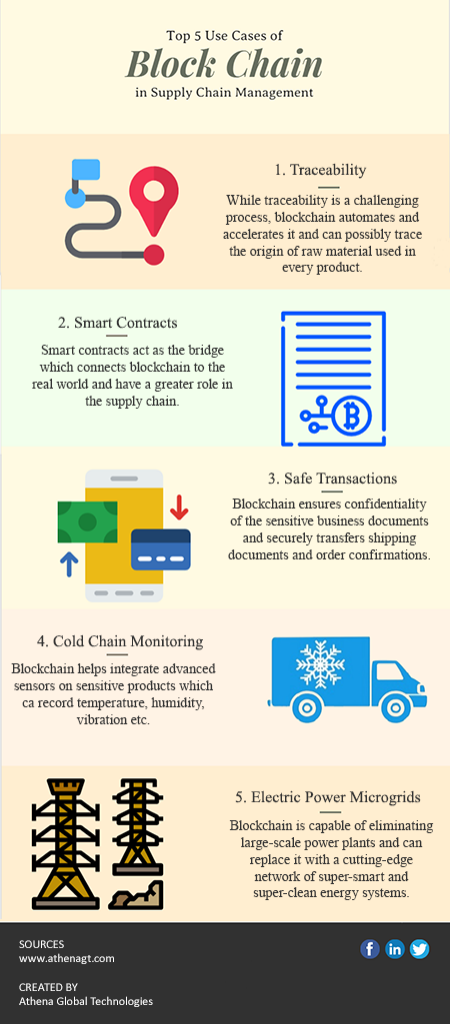
Blockchain technology cannot generate any benefit for Supply Chain Management on its own. This brings us to an obvious question – for which desired future processes could blockchain technology be the enabler? For the answer, we have identified top 5 use cases of blockchain in supply chain management. Continue reading!
- Traceability
Notably but not exclusively in the food sector, the legitimate traceability of the original source of ingredients and commodities is much needed to obtain a valid license required for smooth running of a trustworthy business. While traceability is a challenging process, blockchain automates and accelerates it and makes it much simpler with the help of corresponding electronic tracking technologies like WiFi, BLE or RFID. The futuristic blockchain technology in supply chain can possibly trace the origin of raw material used in every product.
The inherent use cases of blockchain application in logistics are manifold:
- Blockchain enables the supply chain partners to track the quantity and monitor the deportations of raw materials at ease
- Blockchain enables smart tendering. Cribs equipped with RFID tags can express their requisites to move from point A to point B on a blockchain ledger
- The shipment is easily tracked on the blockchain as it moves through the supply chain
All of these steps are executed automatically through blockchain, including other perks such as eliminating ponderous negotiations and data manipulations and improving efficiency.
- Smart Contracts
Smart contracts are pre-defined logics which are stored and duplicated on a distributed storage platform like blockchain technology. If blockchain technology gives us a distributed trustworthy storage then its use case – smart contract gives us distributed trustworthy calculations.
- Smart contracts act as the bridge which connects blockchain to the real world and has a greater role in the supply chain
- Smart contracts can be used for automated execution of payments in case of an in-quality and on-time delivery
- With the help of smart contracts, blockchain ensures transparency, efficiency, security, and traceability
- Smart contracts are automatically triggered when predefined conditions are met and help reduce/eliminate the requirement of intermediaries
Initialization of the Smart Contract:
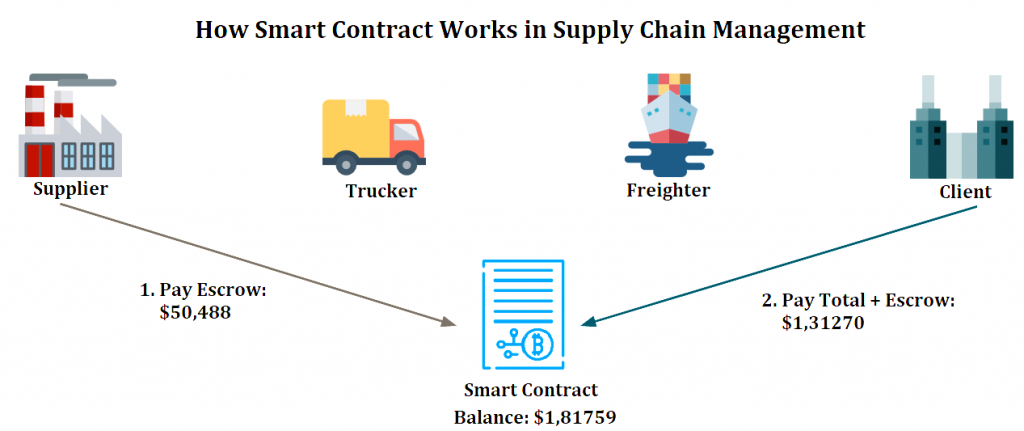
Completion of the last transfer:
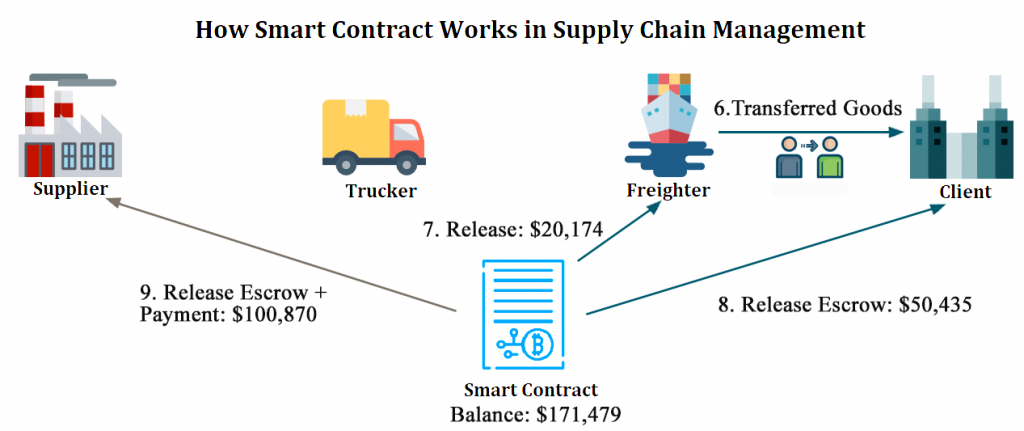
In the above example, we have illustrated how smart contract of blockchain works for supply chain automation. An Ethereum smart contract is used as the central interface between the involved parties. The supply chain entity receives payments and deposits and releases them to the corresponding parties in due time. In order to facilitate the smooth and tamper-proof transaction, the entire interfacing happens via the smart contract.
Both the parties involved in supply chain perform a digital deal with the smart contract confirming the transfer of the goods to the next party. When both parties have completed the deal, the blockchain assumes that the goods are now in control of the second party. When required, payments are being released.
- Safe Transactions
This is another important usage for blockchain in supply chain management. One of the major aspects of blockchain lies in its capability of assessing data. It further enables the user with a valid timestamp using which he can follow and track the ‘journey’ of data. Blockchain has simplified and safeguarded safe transactions –
- Blockchain ensures confidentiality of the sensitive business documents
- Blockchain securely transfers shipping documents and order confirmations
- Blockchain along with the help of smart contracts enables automation of order books
- Cold Chain Monitoring
Food and pharmaceutical products demand a special warehouse. Businesses, therefore, consider sharing of the warehouses and distribution centers as cost effective, instead of each one paying for their own. Blockchain can help the businesses monitor the health and quality of their goods in the warehouse.
- Blockchain helps integrate advanced sensors on sensitive products which ca record temperature, humidity, vibration etc.
- Blockchain maintains a record of all these readings
- The readings in blockchain are permanent and tamperproof
- Each member of the blockchain can always check if any storage condition is altered from what has been agreed upon
A smart contract can be used to determine the size of the deviation to adjust the storage. Besides, smart contracts can also be used to change “use-by” dates, declaring products unfit, or applying penalties.
- Electric power microgrids
This is one of the best use case examples, which shows how blockchain in supply chain can be used by entities of any size. To summarize, blockchain technology is not only meant for the big players in the industry, but small-scale companies can also largely benefit from it. The blockchain is now capable of eliminating large-scale power plants and can replace it with a cutting-edge network of super-smart and super-clean energy systems.
- Smart contracts are now used by several microgrid projects for redistributing excess power from solar panels
- The microgrids’ accounting is now decentralized and shared by everyone on the network
- Blockchain has now made the microgrids’ accounting virtually tamper-proof, as everyone has their own, regularly updated copy of the ledger
- Through blockchain, customers can now choose to power their homes through a wide range of local renewable energy sources
Challenges faced by blockchain in supply chain management

Blockchain for supply chain has its limitations too. Businesses that want to empower blockchain for their supply chain are suggested to watch out for the following constraints –
- The ecosystem needs to develop
Companies, who have already integrated blockchain, will have to look for partners who purchased blockchain. Just as the first telephone invented was useless until the second one arrived. And it was only when phone became ubiquitous that nobody can now stay without it. It’s the same case with the blockchain in supply chain management.
- Fluctuation in currency
Cryptocurrency is the latest trend to start using blockchain. However, the underlying problem is the cryptocurrency exchange rates can possibly change rapidly with other currencies. Payment methods must be flexible enough to be able to cash in the cryptocurrency and recover the value expected. They are also volatile in another sense i.e. you lose the passcode to your cryptocurrency reserve, there is no other way you can retrieve it.
- Mindset
Blockchain was initiated by enterprises who wanted to decentralize applications and operations. They wanted to make the dependency on centralized institutions like banks as optional and not obligatory. However, people with stereotypical mindset will need time for getting into the swing of the blockchain movement and adopt this new way of thinking.
Conclusion
Blockchain in supply chain can bring about unfathomable transformation across industries and ecosystems. Interestingly, entities such as banks can look up to these opportunities and integrate blockchain to streamline their own business. As Rome was not built in a day, a complete transformation of supply chains will not happen overnight per se. However, supply chains should start integrating blockchain into small portions of their operations. Blockchain use cases such as smart contracts can help eliminate downtime and reduce cost and waste occurring due to manual handling of paperwork. By doing so, they pave the path to smarter, faster, secured supply chain from one end to the other.
Let us know your views on this post.

Blockchain has a good future and there is not doubt about it. I think it will take at least 5-6 years for it to become mainstream.